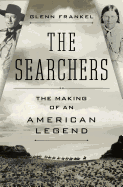
In The Searchers, Pulitzer-winning journalist Glenn Frankel suggests there are layers to John Ford's classic 1956 film The Searchers that most of its audience won't have noticed.
First, the history: it was a desperate time for the nomadic Comanches in the winter of 1836. Many had died from hunger and disease; they blamed the white settlers. A hunting party raided the Parker family's East Texas ranch, slaughtering five and capturing five, including a nine-year-old "blonde, blue-eyed princess," Cynthia Ann Parker. She was raised by the tribe, married a Comanche chief and had children. Twenty-four years later, in 1860, she was "rescued" by the Rangers. She never saw her children again, and never readjusted to the white world. She died in 1871.
Alan Lemay was a successful author of westerns when he discovered her story; he knew he had to write a novel about it. The Searchers was published in 1954 to much acclaim; film rights were bought by a businessman who hired Merian C. Cooper as his executive producer. Cooper's other business partner was filmmaker John Ford.
To play Ethan Edwards, the novel's protagonist, Ford cast John Wayne against type as a contemptuous, brutal Indian hater. Once the film was written and filmed, Ford cut it down to its essence, weaving "myth and truth into a seamless fabric."
The "relentless ambiguity" of The Searchers "defeats us," Frankel writes. "We honor its ambition and its artistry. But we have no firm sense of what it means nor how truly great and disturbing it is." Similarly, this book is ambitious, and disturbing, and oh so good. --Tom Lavoie, former publisher

